英语四级语法篇
英语四级语法大全.

语法大全之目录1.名词2.冠词和数词3.代词4.形容词和副词5.动词6.动名词7.动词不定式8.特殊词精讲9.分词10.独立主格11.动词的时态12.动词的语态13.句子的种类14.倒装15.主谓一致16.虚拟语气17.名词性从句18.定语从句19.状语从句20.连词21.情态动词1. 名词名词可以分为专有名词(Proper Nouns)和普通名词(Common Nouns),专有名词是某个(些)人,地方,机构等专有的名称,如Beijing,China等。
普通名词是一类人或东西或是一个抽象概念的名词,如:book,sadness等。
普通名词又可分为下面四类:1)个体名词(Individual Nouns):表示某类人或东西中的个体,如:gun。
2)集体名词(Collective Nouns):表示若干个个体组成的集合体,如:family。
3)物质名词(Material Nouns):表示无法分为个体的实物,如:air。
4)抽象名词(Abstract Nouns):表示动作、状态、品质、感情等抽象概念,如:work。
个体名词和集体名词可以用数目来计算,称为可数名词(Countable Nouns),物质名词和抽象名词一般无法用数目计算,称为不可数名词(Uncountable Nouns)。
归纳一下,名词的分类可以下图表示:_______________________________________ ||专有名词||| 名|| 个体名词|||||| 可数名词|||| 集体名词||||普通名词|||| 词|| 物质名词|||||| 不可数名词|||| 抽象名词||1.1 名词复数的规则变化___________________________________________________ 情况构成方法读音例词__________________________________________________一般情况加-s 1.清辅音后读/s/;map-maps2.浊辅音和元音后bag-bags读/z/;car-cars ___________________________________________________以s,sh,ch,x等结尾的词加-es读/iz/bus-buseswatch-watches ___________________________________________________ 以ce,se,ze,(d)ge等结尾的词加-s读/iz/license-licenses___________________________________________________ 以辅音字母+y变y 为i结尾的词再加es读/z/baby---babies___________________________________________________ 1.2 其它名词复数的规则变化1) 以y结尾的专有名词,或元音字母+y 结尾的名词变复数时,直接加s变复数:如:two Marys the Henrysmonkey---monkeys holiday---holidays比较:层楼:storey ---storeys story---stories2) 以o 结尾的名词,变复数时:a. 加s,如:photo---photos piano---pianosradio---radios zoo---zoos;b. 加es,如:potato--potatoes tomato--tomatoesc. 均可,如:zero---zeros / zeroes3) 以f或fe 结尾的名词变复数时:a. 加s,如:belief---beliefs roof---roofssafe---safes gulf---gulfs;b. 去f,fe 加ves,如:half---halvesknife---knives leaf---leaves wolf---wolveswife---wives life---lives thief---thieves;c. 均可,如:handkerchief:handkerchiefs / handkerchieves1.3 名词复数的不规则变化1)child---children foot---feet tooth---teethmouse---mice man---men woman---women注意:与man 和woman构成的合成词,其复数形式也是-men 和-women。
2023年6月英语四级语法练习及答案(5篇)
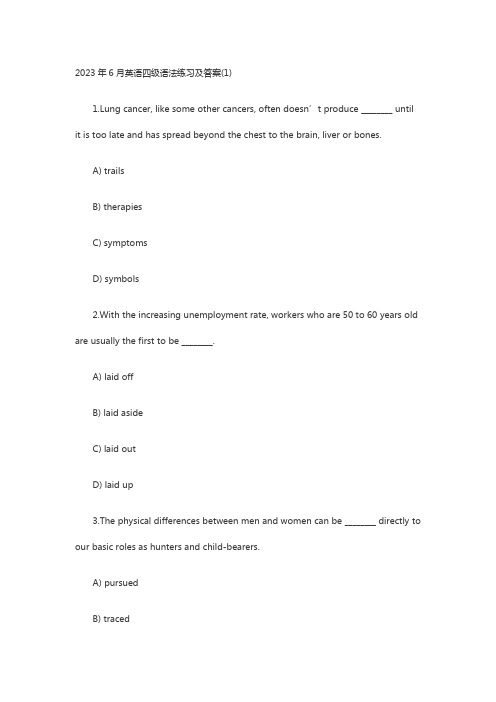
2023年6月英语四级语法练习及答案(1)1.Lung cancer, like some other cancers, often doesn’t produce ________ until it is too late and has spread beyond the chest to the brain, liver or bones.A) trailsB) therapiesC) symptomsD) symbols2.With the increasing unemployment rate, workers who are 50 to 60 years old are usually the first to be ________.A) laid offB) laid asideC) laid outD) laid up3.The physical differences between men and women can be ________ directly to our basic roles as hunters and child-bearers.A) pursuedB) tracedC) switchedD) followed4.It is clear that the dog has a much greater ________ of its brain devoted to smell than is the case with humans.A) compositionB) compoundC) percentD) proportion5.American college students are increasingly ________ with credit card debt and the consequences can be rather serious.A) boostedB) burdenedC) dischargedD) dominated1.答案:C参考译文:肺癌和其他癌症一样经常没有症状直到晚期扩散到脑、肝和骨头才会有症状产生。
英语四级语法

• 1. (1)掌握主从句谓语动词的规范搭配:
• 主句
从句 (if)
• 与现在事实相反 would/情态动词过去式+do were (不分人称)/did 与过去事实相反 would/情态动词过去式+have done had done 与将来事实相反 would/情态动词过去式+do should do / were to do
• 1. 现在分词表示主动,表示动作在进行。 过去分词表示被动,表示动作结束了的状态或结果。
• 2. 分词做状语,注意区分分词的一般式与完成式:
• (1)表示时间,多置于句首,注意如果分词表示的动作的时间先于谓语 动词,要用完成式。
• (2)表示原因,置于句首句尾均可,根据情况有时要用完成式,有时用 一般式。
• (2)区分主从句表示的不同时间概念:
• (3)识别事实和假设混合句:
• (4) 省略if, 条件从句倒装
• 2. 从句的谓语动词需用(should+)动词原形表示虚拟。考生应熟悉:
• (1)下列动词做谓语时,that宾语从句中的动词用虚拟形式:
desire, advise, recommend, command, direct, order, ask, demand, request, require, insist, maintain, move, propose, prefer, urge, vote。
• (3)If only…谓语动词视情况选用适当的形式。
• (4)lest/for fear that/in case 从句谓语用(should+)动词原形。
• (5)whether…or…有时谓语用be的原形,引导让步虚拟从句,这种用 法经常采用倒装结构。如: The business of each day, be it selling
完整版)大学英语四级语法大全
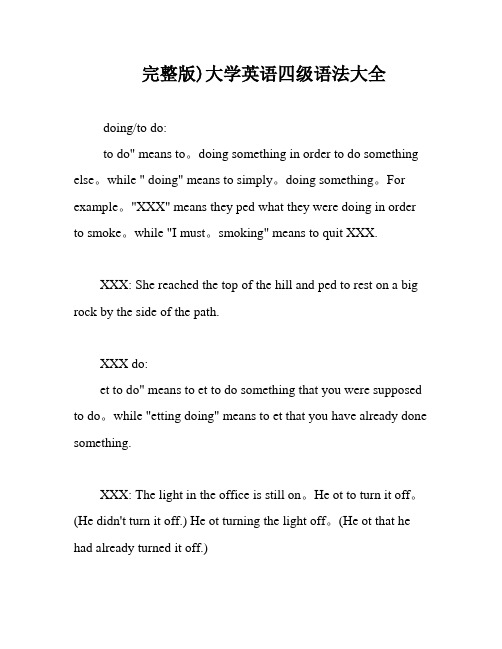
完整版)大学英语四级语法大全doing/to do:to do" means to。
doing something in order to do something else。
while " doing" means to simply。
doing something。
For example。
"XXX" means they ped what they were doing in order to smoke。
while "I must。
smoking" means to quit XXX.XXX: She reached the top of the hill and ped to rest on a big rock by the side of the path.XXX do:et to do" means to et to do something that you were supposed to do。
while "etting doing" means to et that you have already done something.XXX: The light in the office is still on。
He ot to turn it off。
(He didn't turn it off.) He ot turning the light off。
(He ot that he had already turned it off.)XXX do:Remember to do" means to remember to do something that you need to do。
while "remembering doing" means to remember that you have already done something.XXX: XXX.)Remember to go to the post office after school。
英语四级语法总结

英语四级语法总结英语四级语法总结英语四级语法是英语四级考试中的重要一部分,掌握好语法知识对于提高阅读、写作以及听力的能力都有很大的帮助。
下面是英语四级语法的总结,希望对大家备考四级有所帮助。
一、时态1. 一般现在时用于表达经常性、习惯性的动作、状态或客观事实。
结构:主语 + 动词原形 (+其他)例如:She often goes jogging in the morning.她经常在早上慢跑。
Water boils at 100 degrees Celsius.水在100摄氏度时沸腾。
2. 现在进行时用于表示现阶段正在进行的动作。
结构:主语 + be动词(am/is/are) + 现在分词 (+其他)例如:I am studying for the exam.我正在为考试而学习。
3. 一般过去时用于表示已经发生过的动作或状态。
结构:主语 + 动词过去式 (+其他)例如:She traveled to Japan last year.她去年去了日本。
4. 过去进行时用于表示过去某个时间里正在进行的动作。
结构:主语 + was/were + 现在分词 (+其他)例如:They were watching a movie at 8 p.m. yesterday.昨天晚上8点他们正在看电影。
5. 一般将来时用于表示将来发生的动作或状态。
结构:主语 + will/shall + 动词原形 (+其他)例如:We will go on a trip next month.我们下个月将去旅行。
6. 将来进行时用于表示将来某个时间段里正在进行的动作。
结构:主语 + will be + 现在分词 (+其他)例如:He will be sleeping at midnight.他将在午夜时睡觉。
7. 现在完成时用于表示过去发生的动作对现在造成的影响或结果。
结构:主语 + have/has + 过去分词 (+其他)例如:I have finished my homework.我已经完成作业。
大学英语四级主要语法
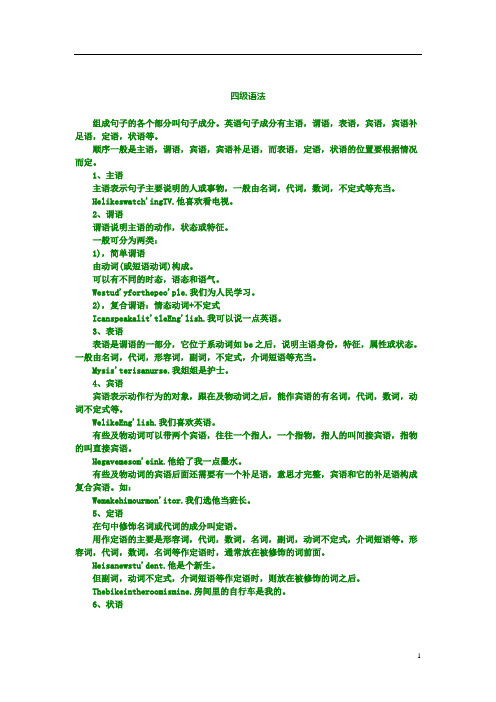
四级语法组成句子的各个部分叫句子成分。
英语句子成分有主语,谓语,表语,宾语,宾语补足语,定语,状语等。
顺序一般是主语,谓语,宾语,宾语补足语,而表语,定语,状语的位置要根据情况而定。
1、主语主语表示句子主要说明的人或事物,一般由名词,代词,数词,不定式等充当。
Helikeswatch'ingTV.他喜欢看电视。
2、谓语谓语说明主语的动作,状态或特征。
一般可分为两类:1),简单谓语由动词(或短语动词)构成。
可以有不同的时态,语态和语气。
Westud'yforthepeo'ple.我们为人民学习。
2),复合谓语:情态动词+不定式Icanspeakalit'tleEng'lish.我可以说一点英语。
3、表语表语是谓语的一部分,它位于系动词如be之后,说明主语身份,特征,属性或状态。
一般由名词,代词,形容词,副词,不定式,介词短语等充当。
Mysis'terisanurse.我姐姐是护士。
4、宾语宾语表示动作行为的对象,跟在及物动词之后,能作宾语的有名词,代词,数词,动词不定式等。
WelikeEng'lish.我们喜欢英语。
有些及物动词可以带两个宾语,往往一个指人,一个指物,指人的叫间接宾语,指物的叫直接宾语。
Hegavemesom'eink.他给了我一点墨水。
有些及物动词的宾语后面还需要有一个补足语,意思才完整,宾语和它的补足语构成复合宾语。
如:Wemakehimourmon'itor.我们选他当班长。
5、定语在句中修饰名词或代词的成分叫定语。
用作定语的主要是形容词,代词,数词,名词,副词,动词不定式,介词短语等。
形容词,代词,数词,名词等作定语时,通常放在被修饰的词前面。
Heisanewstu'dent.他是个新生。
但副词,动词不定式,介词短语等作定语时,则放在被修饰的词之后。
Thebikeintheroomismine.房间里的自行车是我的。
大学英语四级语法大全
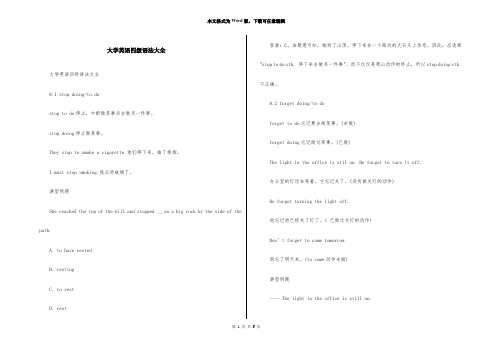
大学英语四级语法大全大学英语四级语法大全8.1 stop doing/to dostop to do停止,中断做某事后去做另一件事。
stop doing停止做某事。
They stop to smoke a cigarette.他们停下来,抽了根烟。
I must stop smoking.我必须戒烟了。
典型例题She reached the top of the hill and stopped ___on a big rock by the side of the path.A. to have restedB. restingC. to restD. rest答案:C。
由题意可知,她到了山顶,停下来在一个路边的大石头上休息。
因此,应选择"stop to do sth. 停下来去做另一件事"。
而不仅仅是爬山动作的终止,所以stop doing sth.不正确。
8.2 forget doing/to doforget to do忘记要去做某事。
(未做)forget doing忘记做过某事。
(已做)The light in the office is stil on. He forgot to turn it off.办公室的灯还在亮着,它忘记关了。
(没有做关灯的动作)He forgot turning the light off.他忘记他已经关了灯了。
( 已做过关灯的动作)Don’t forget to come tomorrow.别忘了明天来。
(to come动作未做)典型例题---- The light in the office is still on.---- Oh,I forgot___.A. turning it offB. turn it offC. to turn it offD. having turned it off答案:C。
由the light is still on 可知灯亮着,即关灯的动作没有发生,因此用forget to do sth.而forget doing sth表示灯已经关上了,而自己忘记了这一事实。
英语四级考试语法结构与词汇
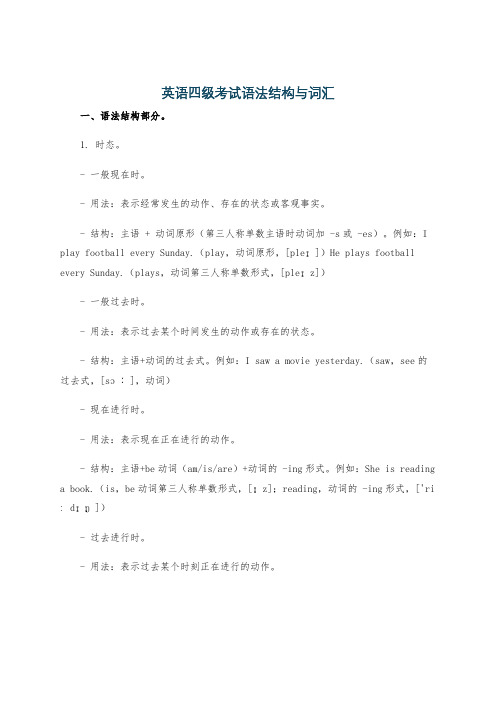
英语四级考试语法结构与词汇一、语法结构部分。
1. 时态。
- 一般现在时。
- 用法:表示经常发生的动作、存在的状态或客观事实。
- 结构:主语 + 动词原形(第三人称单数主语时动词加 -s或 -es)。
例如:I play football every Sunday.(play,动词原形,[pleɪ])He plays football every Sunday.(plays,动词第三人称单数形式,[pleɪz])- 一般过去时。
- 用法:表示过去某个时间发生的动作或存在的状态。
- 结构:主语+动词的过去式。
例如:I saw a movie yesterday.(saw,see的过去式,[sɔː],动词)- 现在进行时。
- 用法:表示现在正在进行的动作。
- 结构:主语+be动词(am/is/are)+动词的 -ing形式。
例如:She is reading a book.(is,be动词第三人称单数形式,[ɪz];reading,动词的 -ing形式,['ri ːdɪŋ])- 过去进行时。
- 用法:表示过去某个时刻正在进行的动作。
- 结构:主语+be动词(was/were)+动词的 -ing形式。
例如:He was watching TV at 8 o'clock last night.(was,be动词第一、三人称单数过去式,[wɒz];watching,动词的 -ing形式,['wɒtʃɪŋ])2. 从句。
- 定语从句。
- 概念:在句中作定语,修饰名词或代词。
- 关系代词:who(指人,主格,[huː]),whom(指人,宾格,[huːm]),which(指物,[wɪtʃ]),that(指人或物,[ðæt])。
例如:The boy who/that is standing there is my brother.(这里who/that引导定语从句修饰the boy)- 名词性从句。
大学英语四级语法指导四篇
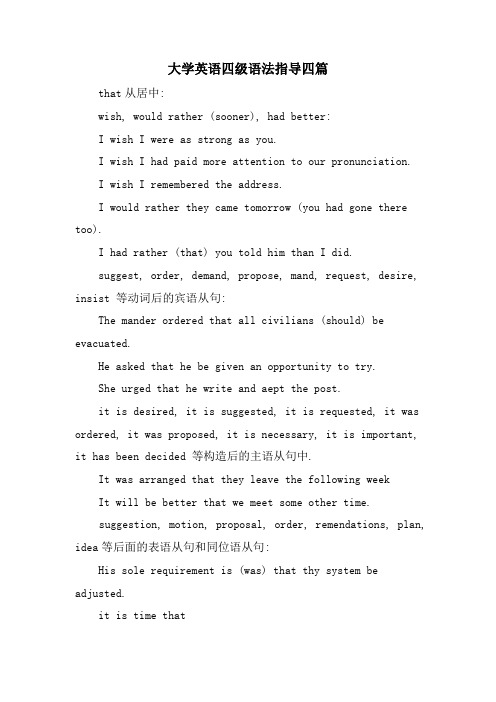
大学英语四级语法指导四篇that从居中:wish, would rather (sooner), had better:I wish I were as strong as you.I wish I had paid more attention to our pronunciation.I wish I remembered the address.I would rather they came tomorrow (you had gone there too).I had rather (that) you told him than I did.suggest, order, demand, propose, mand, request, desire, insist 等动词后的宾语从句:The mander ordered that all civilians (should) be evacuated.He asked that he be given an opportunity to try.She urged that he write and aept the post.it is desired, it is suggested, it is requested, it was ordered, it was proposed, it is necessary, it is important, it has been decided 等构造后的主语从句中.It was arranged that they leave the following weekIt will be better that we meet some other time.suggestion, motion, proposal, order, remendations, plan, idea等后面的表语从句和同位语从句:His sole requirement is (was) that thy system be adjusted.it is time thatIt is time that we went (或should go) to bed.It is high time we (should) put an end to this controversy.as if (though) 引起的从句:They talked (are talking) as if they had been friends for years.It seems as if it was (were) spring today.He acts (acted) as if (though) he were (was) an expert.以lest, for fear that 和 in case 引起的从句(这时谓语多用 should +动词原形):He took his raincoat with him lest it should rain.He put his coat over the child for fear that (或lest) he should catch cold.I'll keep a seat for you in case you should need it.以whatever, whoever, no matter what这类代词或词组引起的从句(这时, 谓语多用may加动词原形构成):Whatever defects he may have, he is an honest man.Come what may, we will go ahead. 不管发生什么情况, 我们都要干下去.I aept that he is old and frail; be that as it may,he's still a good politician.我成认他年老体衰, 然而尽管如此, 它仍是优秀的政治家.1. The children went there to watch the iron tower D.A to erectB be erectedC erectingD being erectedwatch 看电视用,看比赛用; see 看电影用;感官动词watch, see, hear; 感官动词 + 名词(代词)+ do be erected 强调的是动作的结果; being erected 强调的是动作的过程。
英语四级语法总结(全)
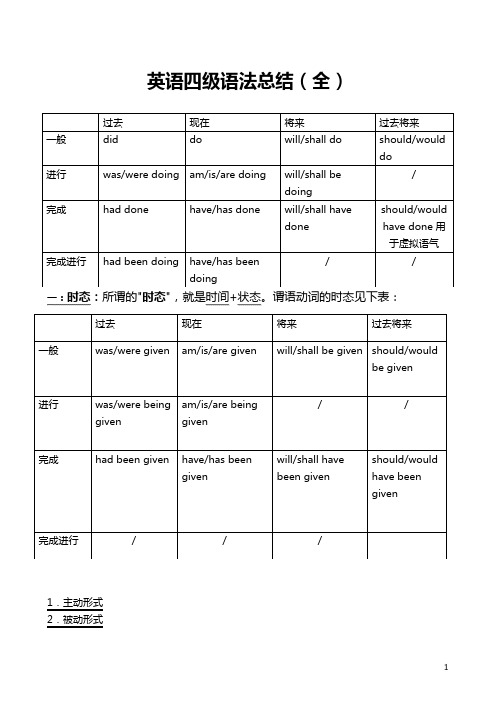
英语四级语法总结(全)一:时态:所谓的"时态",就是时间+状态。
谓语动词的时态见下表:1.主动形式2.被动形式❖CET-4 常考的三种时态:过去完成时;将来完成时;(现在/过去)完成进行时。
❖时间状语从句当中的时态:一般过去时所有的过去用一般现在时表示现在和将来现在完成时现在完成和将来完成一.非谓语动词一.不定式:一)不定式的常考形式:1)一般形式:He decided to work harder in order to catch up with the others.被动形式: He preferred to be assigned some heavier work to do.语法功能:表示与谓语动词同步发生2)完成形式:He pretended not to have seen me.被动形式:The book is said to have been translated into many languages.语法功能:表示发生在谓语动词之前二)不定式常考的考点:1)不定式做定语----将要发生2)不定式做状语----目的3)不定式充当名词功能---To see is to believe.三)不定式的省略1)感官动词 see, watch, observe, notice, look at, hear, listen to, smell, taste, feel+ do 表示动作的完整性,真实性;+ doing表示动作的连续性,进行性I saw him work in the garden yesterday.昨天我看见他在花园里干活了。
(强调"我看见了"这个事实)I saw him working in the garden yesterday.昨天我见他正在花园里干活。
(强调"我见他正干活"这个动作)❖感官动词后面接形容词而不是副词:The cake tastes good; It feels comfortable.2) 使役动词 have bid make let 等词后不定式要省略但同1)一样被动以后要还原toI ‘d like to have John do it.I have my package weighed.Paul doesn’t have to be made to learn.3) help help sb do help sb to do help do help to do四)有些动词后只跟不定式如:want,wish,hope,manage,promise,refuse,pretend,plan, offer,decide,agree,expect allow sb to do, cause sb to do , permit sb to do, enable sb to do force sb to do. be more likely to do love to do warn sb to do be able to dobe ambitious to do. begin to do . start to do五) 有的时候to后面要接-ing形式accustom (oneself) to; be accustomed to; face up to; in addition to; look forward to; object to; be reduced to; resign oneself to; be resigned to; resort to; sink to; be used to; be alternative to; be close/closeness to; be dedication/dedicated to; be opposition/opposed to; be similarity/similar to.三、need/want 后的-ing形式具有被动的意思。
1-英语专业四级词汇语法辅导--从句

Company Logo
24
原因状语从句
• Because, since, as和for
• because语气最强,强调原因。回答 “why”问句。表原因的强调句型中,也只 用because。在“not…but…”结构中, 也用它。
• e.g. He decided to give up the chance of going abroad, not because he did not want to but because his wife was ill.
Company Logo
12
注意事项
• 3. It + be + 时间 + before-clause • 这个句型中的时间一般为表示一段时间的词语(如:
long years , months , weeks , days ,hours , minutes ) ,主句中的谓语动词 用肯定式,意为"过多长时间才......"。 • 主句的谓语动词是否定式时,意为"没过多长时间 就......"。主句的时态可用过去时was或将来时 will be;用was 时,before从句的动词用一般 过去时;用will be 时,before从句常用一般现 在时。 例如:
• A before B until C since D when
Company Logo
13
真题
• 60. The couple had no sooner got to the station ____ the coach left. (2009)
• A. when B. as C. until D. than • 56. I enjoyed myself so much ___
大学的英语四级语法.ppt

动名词
具有动作性特征的名词 1)是名词 seeing is believing 2)具有动词性特征可以带宾语
一)动名词的形式:
一般形式:I don't like you smoking. 完成形式:I regret not having taken your
advice. 被动形式:This question is far from being
He pretended not to have seen me.
b) 进行式: 如果主要谓语表示的动作(状 态)发生时, 不定式表示的动作正在进行, 这时要用不定式的进行式. You are not supposed to be working. You haven’t quite recovered yet. We didn’t expect you to be waiting for us here. He pretended to be listening attentively.
3) 不带to 的不定式:
a) 在“动词+ 宾语+不定式”结构中, 如果动 词是表示感觉意义的see, hear, watch, smell, feel, notice等, 或是表示“致使”意义的 have, make, let等, 其后的不定式结构不带to. John made her tell him everything.
I’ve heard tell of him.
(听说、听到)
d) 在动词help(或help +宾语)之后可用不带to的不定式, 也可用带to的不定式. Can I help (to) lift this heavy box?
e) 在介词except, but 之后, 如果其前有动词do的某种 形式, 不定式一般不带to, 反之带to. There is nothing to do except wait till it stops raining. Smith will do anything but work on a farm. There’s no choice but to wait till it stops raining.
英语四级必考知识点总结
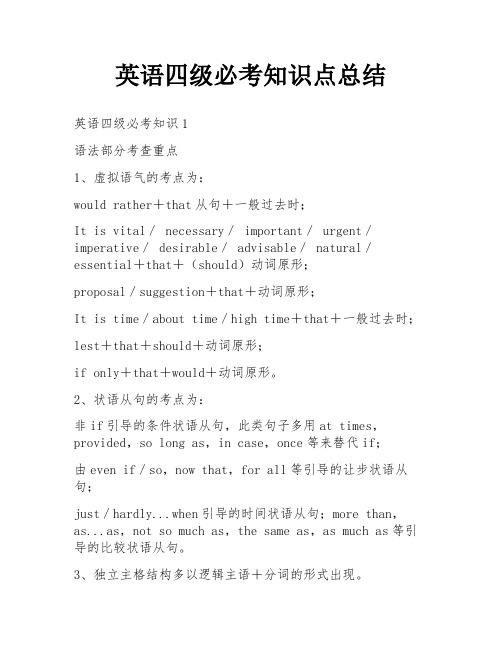
英语四级必考知识点总结英语四级必考知识1语法部分考查重点1、虚拟语气的考点为:would rather+that从句+一般过去时;It is vital/ necessary/ important/ urgent/imperative/ desirable/ advisable/ natural/essential+that+(should)动词原形;proposal/suggestion+that+动词原形;It is time/about time/high time+that+一般过去时;lest+that+should+动词原形;if only+that+would+动词原形。
2、状语从句的考点为:非if引导的条件状语从句,此类句子多用at times,provided,so long as,in case,once等来替代if;由even if/so,now that,for all等引导的让步状语从句;just/hardly...when引导的时间状语从句;more than,as...as,not so much as,the same as,as much as等引导的比较状语从句。
3、独立主格结构多以逻辑主语+分词的形式出现。
4、情态动词多与完成时形式连用。
5、定语从句重点考查介词+关系代词(which)和as作为关系代词。
英语四级必考知识2词汇部分考查重点1、动词、名词与介词的搭配如:popular/patient+with;yield/solution/adapt/transfer/access+to;accuse/require+of;charge+for;under+discussion等等。
2、习惯用法如:confess to/set about/be used to+doing;be supposed to/have/make sb.+do等。
3、由同一动词构成的短语如:e,go,set,break等构成的短语。
英语四级语法总结(全)

英语四级语法总结(全)一:时态:所谓的"时态",就是时间+状态。
谓语动词的时态见下表:1.主动形式2.被动形式❖CET-4 常考的三种时态:过去完成时;将来完成时;(现在/过去)完成进行时。
❖时间状语从句当中的时态:一般过去时所有的过去用一般现在时表示现在和将来现在完成时现在完成和将来完成一.非谓语动词一.不定式:一)不定式的常考形式:1)一般形式:He decided to work harder in order to catch up with the others.被动形式: He preferred to be assigned some heavier work to do.语法功能:表示与谓语动词同步发生2)完成形式:He pretended not to have seen me.被动形式:The book is said to have been translated into many languages.语法功能:表示发生在谓语动词之前二)不定式常考的考点:1)不定式做定语----将要发生2)不定式做状语----目的3)不定式充当名词功能---To see is to believe.三)不定式的省略1)感官动词 see, watch, observe, notice, look at, hear, listen to, smell, taste, feel+ do 表示动作的完整性,真实性;+ doing表示动作的连续性,进行性I saw him work in the garden yesterday.昨天我看见他在花园里干活了。
(强调"我看见了"这个事实)I saw him working in the garden yesterday.昨天我见他正在花园里干活。
(强调"我见他正干活"这个动作)❖感官动词后面接形容词而不是副词:The cake tastes good; It feels comfortable.2) 使役动词 have bid make let 等词后不定式要省略但同1)一样被动以后要还原toI ‘d like to have John do it.I have my package weighed.Paul doesn’t have to be made to learn.3) help help sb do help sb to do help do help to do四)有些动词后只跟不定式如:want,wish,hope,manage,promise,refuse,pretend,plan, offer,decide,agree,expect allow sb to do, cause sb to do , permit sb to do, enable sb to do force sb to do. be more likely to do love to do warn sb to do be able to dobe ambitious to do. begin to do . start to do五) 有的时候to后面要接-ing形式accustom (oneself) to; be accustomed to; face up to; in addition to; look forward to; object to; be reduced to; resign oneself to; be resigned to; resort to; sink to; be used to; be alternative to; be close/closeness to; be dedication/dedicated to; be opposition/opposed to; be similarity/similar to.三、need/want 后的-ing形式具有被动的意思。
(完整word版)英语四级考试重点语法精选汇总

(完整word版)英语四级考试重点语法精选汇总⼤学英语四级语法精要⼀、动词(时态,语态,⽤法,省略,⼀致性等)(⼀)时态1、主动形式过去现在将来过去将来⼀般did do will/shall do should/would do进⾏was/were doing am/is/are doing will/shall be doing /完成had done have/has done will/shall have done should/would have done⽤于虚拟语⽓完成进⾏had been doing have/has been doing / /2、被动形式过去现在将来过去将来⼀般was/were given am/is/are given Will / shall begiven should/would be given进⾏was/were being given am/is/are being given / /完成was/were being given am/is/are being given / / 完成进⾏/ / / /· CET-4 常考的三种时态:过去完成时;将来完成时;(现在/过去)完成进⾏时。
·时间状语从句当中的时态:⼀般过去时所有的过去⽤⼀般现在时表⽰现在和将来现在完成时现在完成和将来完成3(have/has + -ing 分词构成): 动作或状态从过去某时开始,继续到现在,可能继续下去,也可能刚刚结束.· I’ve been writing letters for an hour. I’ve bee n sitting in the garden.4、过去完成进⾏时(由had been + ing分词构成): 过去某个时刻以前⼀直在进⾏的动作· We had been waiting for her for two hours by the time she came.5、将来完成进⾏时: 将来某个时刻以前⼀直在进⾏的动作.· By next summer, he will have been working here for twenty years.6、将来完成时(由shall/will have + 过去分词构成): 将来某时会业已发⽣的事.· I shall have finished this one before lunch.They’ll have hit the year’s target by the end of October.(⼆)语态1、可以有两种被动结构的类型,例如:· He was said to be jealous of her success.It was said that he was jealous of her success.·能同时适⽤于上述两个句型的主动词通常都是表⽰“估计”,“相信”等意义的动词,常见的有:assume,believe,expect,fear,feel,know,presume,report,say,suppose,understand等。
英语四级常见语法总结
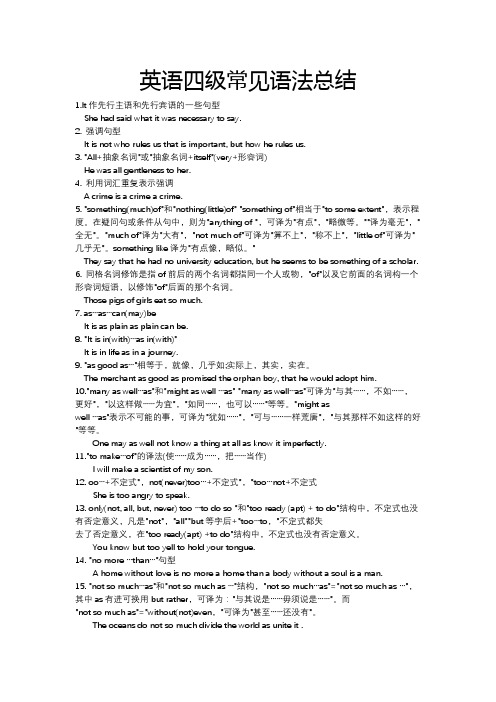
英语四级常见语法总结1.It作先行主语和先行宾语的一些句型She had said what it was necessary to say.2. 强调句型It is not who rules us that is important, but how he rules us.3. "All+抽象名词"或"抽象名词+itself"(very+形容词)He was all gentleness to her.4. 利用词汇重复表示强调A crime is a crime a crime.5. "something(much)of"和"nothing(little)of" "something of"相当于"to some extent",表示程度。
在疑问句或条件从句中,则为"anything of ",可译为"有点","略微等。
""译为毫无","全无"。
"much of"译为"大有","not much of"可译为"算不上","称不上","little of"可译为"几乎无"。
something like译为"有点像,略似。
"They say that he had no university education, but he seems to be something of a scholar.6. 同格名词修饰是指of前后的两个名词都指同一个人或物,"of"以及它前面的名词构一个形容词短语,以修饰"of"后面的那个名词。
英语专业四级语法汇总

语法回顾篇专四语法考点虚拟语气、情态动词、非谓语动词、复合句、倒装、小语法(省略,时态,反义疑问句,代词,强调句,主谓一致,冠词,形容词及副词)、as 的特殊用法。
专四英语语法考点串讲之一虚拟语气一般说来,有下列几种考点需要考生注意(十考点及两备考点)考点1. 与现在事实相反从句谓语动词用did(be用were),主句谓语动词would(should,could,might)+do;考点2. 与过去事实相反从句谓语动词用had done,主句谓语动词用would(should,could,might)+ have done;例如:43.I _________the party much more if there hadn‟t been quite such a crowd of people there.A. would enjoyB. will have enjoyedC. would have enjoyedD. will be enjoying49.All of us would have enjoyed the party much more if there _________ quite such a crowd of people there.A. weren‟tB. hasn‟t beenC. hadn‟t beenD. wouldn‟t考点3.与将来事实相反,从句谓语动词用:did(should+do或were + to do),主句谓语动词用:would(should,could,might)+do。
例如:43. If your car ___ any attention during the first 12 months, take it to an authorized dealer.(08年)• A. shall need C. would need• B. should need D. will need考点4. 时态的交叉现象,也就是主句与从句的动作发生在不同的时间段例如:If you had gone to see the doctor,you would be all right now.你要是早去看病,你现在就没事了。
英语四级语法总结
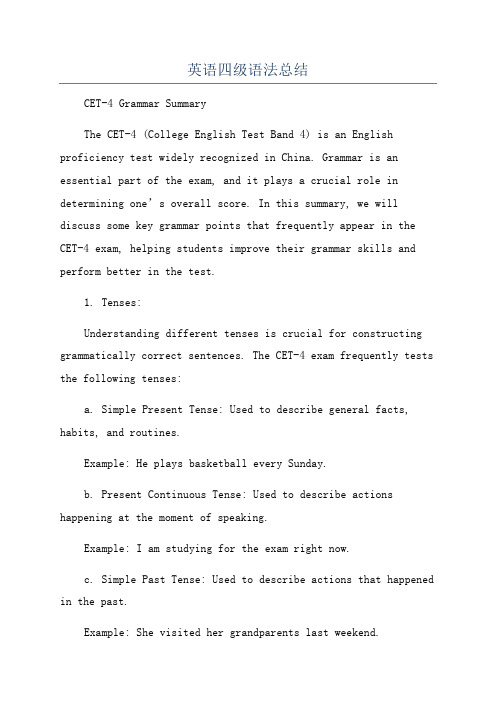
英语四级语法总结CET-4 Grammar SummaryThe CET-4 (College English Test Band 4) is an English proficiency test widely recognized in China. Grammar is an essential part of the exam, and it plays a crucial role in determining one’s overall score. In this summary, we will discuss some key grammar points that frequently appear in the CET-4 exam, helping students improve their grammar skills and perform better in the test.1. Tenses:Understanding different tenses is crucial for constructing grammatically correct sentences. The CET-4 exam frequently tests the following tenses:a. Simple Present Tense: Used to describe general facts, habits, and routines.Example: He plays basketball every Sunday.b. Present Continuous Tense: Used to describe actions happening at the moment of speaking.Example: I am studying for the exam right now.c. Simple Past Tense: Used to describe actions that happened in the past.Example: She visited her grandparents last weekend.d. Past Continuous Tense: Used to describe actions that were happening in the past.Example: I was cooking dinner when the phone rang.e. Present Perfect Tense: Used to express actions or states that started in the past and continue up to the present.Example: They have lived in this city for five years.f. Present Perfect Continuous Tense: Used to express actions that started in the past, continue in the present, and may continue in the future.Example: She has been studying English for three hours.2. Modals:a. Can: Used to express ability or permission.Example: Can you speak French?b. Could: Used to express possibility or past ability.Example: I could swim when I was young.c. May: Used to express permission or possibility.Example: May I borrow your pen?d. Might: Used to express a small possibility.Example: It might rain later today.e. Must: Used to express strong obligation or certainty.Example: You must finish your homework before going out.f. Should: Used to express advice or suggestion.Example: You should exercise regularly for good health.3. Conditionals:Example: If it rains, I will stay at home.b. Second Conditional: Used to talk about hypothetical or unlikely events in the present or future.Example: If I won the lottery, I would buy a big house.c. Third Conditional: Used to talk about past events and their imaginary results.Example: If he had studied harder, he would have passed the test.4. Passive Voice:The passive voice is used to emphasize the action done to the subject rather than the doer of the action. It is frequently tested in the CET-4 exam. Some key points to remember about the passive voice are:a. The passive voice is formed by using the verb "to be" + past participle of the verb.Example: The book was written by the famous author.b. In the passive voice, the subject receives the action.Example: The cake was eaten by my sister.Example: She wrote a letter. --> A letter was written by her.5. Relative Clauses:Relative clauses are used to provide additional information about the noun in the sentence. The CET-4 exam frequently tests relative clauses, especially those introduced by "who," "which," and "that." Some key points to remember about relative clauses are:a. "Who" is used for people, "which" is used for things, and "that" can be used for both.Example: The girl who won the race is my friend.b. Relative clauses can provide essential or non-essential information.Example: The book that I bought yesterday is very interesting. (essential)Example: My sister, who is a doctor, lives in London. (non-essential)。
- 1、下载文档前请自行甄别文档内容的完整性,平台不提供额外的编辑、内容补充、找答案等附加服务。
- 2、"仅部分预览"的文档,不可在线预览部分如存在完整性等问题,可反馈申请退款(可完整预览的文档不适用该条件!)。
- 3、如文档侵犯您的权益,请联系客服反馈,我们会尽快为您处理(人工客服工作时间:9:00-18:30)。
考前复习语法(3.5mins)1.She could not but _to weep_____ (weep) to hear such a sad story.2. A magnifying glass will make it __looking_____ (look) large.3.I would rather study than ___go____ (go) to such a place.4.The dog needs ____training______ (train).5.She has no alternative but ___to see_____ (see) him.6.J.F.Kennedy liked ___asking________ (ask) many questions at the press conference.7.The one job my husband does not like is ________ (take) out the rubbish.8.They got their car _____washed____ (wash) at the garage.9.I had my suit _________ (press) yesterday.10.A noise that disturbs someone is a ________disturbing_____ (disturb) noise.11.A worker on an exhausting job is an ___(后面是人)exhausted_ (exhaust) worker.12.Before __admitted__(_被动)_____ (admit) to the college, he had to go through an examination.13.The room is crowed, but there are a few seats __will leave________ (leave).14.“A man was killed.”“Where is the body of the _______murdered_______(murder) man?15.____Didn’t recieve_____________ (not receive) his answer, she sent the second letter.16.Our school, _____located______ (locate) on a hill, commands a fine view.17.Mr. Lin asked me if these islands _____belong______ (belong) to America. 18.She wore a wedding dress as if she ____________ (be) a bride.19.“Did you work yesterday?” “I wish yesterday ___was__ (be) a holiday.20.“You didn’t get to the party, did you?”“I do wish ________ (be) there.”21.If you _saw______ (see) Mr. Allen, give him my regards.22.If it ___rained_____ (rain) tomorrow, we will put off our picnic.23.If the United States had built more homes for poor people in 1995, the housing problems now in some parts of this country ___________ (not be) so serious.24.I would buy that book but I ___don’t have_____ (not have) enough money.25.Mary might have come to school in timefor Professor Smith’s lecture but she ___get____ (get) up rather late.26.I hope that you ___are___ (be) all right.27.“What does he wish?”“He wishes ________ (have) his hair ___to____ cut. 28.“What did Peter do?”“He ________ (lie) asleep all morning.29.“What will happen?”“By next June we _____will sell____ (sell) a million refrigerators.30.A man’s dignity __depends________ (depend) on his wealth but on what he is.31.It ____had rained______ (rain) every day so far this month.32.I am going to the ______shoes__ (shoe) store.33.The French ____is____ (be) a very polite people.34.Early to bed and early to rise ______ (make) a man healthy, wealthy and wise. 35._______ (do) the rest of the audience refuse to go out?36.What annoys me about them __are___(be)their constant____complaint__ (complain).37.Neither the Giants nor the Tigers __goes___ (go) to win the pennant.38.Romeo and Juliet____is___ (be) one of my favorite plays.39.The editor and publisher of the magazine __is_____ (be) doing something strangesince this morning.40.He did not sleep all night, and as happens to many and many a man who _______ (read) the Bible, he understood for the first time the full meaning of the words read often before but passed by unnoticed.41.It is said that the tips of the finger are particularly (sense)____.42.You will increase your (efficient) __efficiency___ if you introduce more system into your work.43.His last year’s trousers are now outgrow and need (length)_lengthing___ a little.44.As the students gain confidence inthemselves, they are less (like) ____ to cheat.45.The young man (whomever)_____they said was the most brilliant in the class did prove to be the best.46.The children never received love or (kind) _kindness____ from their parents.47.It was hot in the room and the men began to (loose)__ their ties.48.Because of the effects of weather the rock has an (regular) irregular____ surface. 49.The president was accused of his (weak)__weakness___ in dealing with the crisis. 50.If you want to catch up with advanced enterprise, you’ve got to (modern) ___more modern _ management, not only your equipment.51.__Don’t discuss___ (not discuss), the problem remains unsolved.52.I believe there is some ____ (uncertain) about whether she’s coming.53.She put great ___ (emphasize) on beginning work immediately.54.Developing countries are generally in need of technical _persons__ (person).55.The government put forward a _proposer__ (propose) to improve public transportation.。
